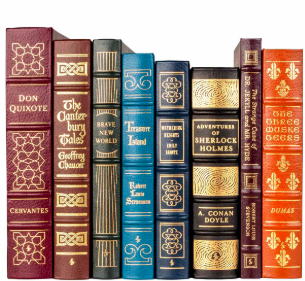Why You Should Read Classic Literature (And 6 Tips On How To Do It)

My dad was a voracious reader. “Voracious” actually doesn’t really even come close to describing how much my dad read. He read everything.
He was one of the smartest people I ever knew. He never graduated college but he always valued education highly. One of the reasons he was so smart was because he read all the time.
I, on the other hand, wasn’t always a reader. I’m not sure why. Perhaps I would have been more of a recreational reader had my dad been around more to influence me in that way. Who knows?
All I know is that I didn’t get that reading gene.
Even without much of his day-to-day influence, reading was still a common thing in my household as a kid. I remember my mom always reading to me. We had easily-accessible books in the house. I loved Calvin and Hobbes. At that age, I enjoyed reading and did it frequently.
But when I got older, I kind of stopped reading for fun and I am not sure why. If I started a book, I would often lose interest in it quickly. Also, the idea of finishing a thick book seemed daunting. I felt it would take me too long. I couldn’t picture myself completing an entire book.
Sounds strange, doesn’t it?
I didn’t really start reading recreationally until a few years ago. I’m not entirely sure what shifted in me. I think it was that I made the decision that I wanted to be a “reader”, something I had never been before.
Not being a reader was an aspect of my personality that I didn’t particularly like. So, I set about to change it.
At that point, I didn’t really have a genre or style of literature that I liked or that spoke to me, so I didn’t really know what to choose.
So, I turned to classic literature. Why classic literature, specifically?
Well, mainly for the coolness factor. I wanted to read books that everyone knew but few had actually read. I wanted to read the famous books. The books that form the foundation of Western civilization. I figured that if I was going to be reading, I might as well make that time count.
I was also determined to stop being such a wuss about it. In the past, big books intimidated me. But I’m a big boy now! And I’m pretty smart! If anyone can handle those books, it’s me!
I made a list of about a dozen famous books I had an interest in reading and got started. At that point, I had time naturally built into my day for reading in the form of a long train commute.
Once the pandemic hit and I started working remotely, I needed to be more intentional about building “reading time” into my daily routine. But I stuck with it as best I could over the years.
Since I made that decision some years ago to be a “reader of classic literature” I have tackled a number of significant works.
Here is a list of some of the books I have read, in no particular order…
Moby Dick
Paradise Lost
Anna Karenina
War and Peace
Richard III
Frankenstein
Dracula
The Sun Also Rises
Walden
1984
Currently, I am reading Les Misérables.
That list is not exhaustive and I know there are some books that maybe wouldn’t be considered “classic literature”, necessarily, but the list is a good representation of the kinds of books I am talking about.
I can confidently say that I am now an actual reader and that I genuinely enjoy classic literature!
But what makes classic literature so wonderful to read? Well, like I said earlier, there is definitely a coolness factor to reading this stuff. Reading a book that everyone knows about, but few have actually read, is like being one of a few who have been to a popular destination.
It’s like saying you’ve seen the Great Pyramids or Machu Picchu or have been to Antarctica.
There’s also the sense of accomplishment that comes from finishing one of these books. Don’t you feel more happiness and satisfaction after completing a rigorous workout rather than an easy one you can phone in? It’s the same kind of thing.
Reading these books will also make you a better person. Art has a way of opening your mind and heart. Remember, these books became popular for a reason. They’re popular because they’re good. Well, most of them, anyway.
And yes, some of them are challenging. But that’s not a bad thing. You should want to challenge yourself a bit with your reading. I’m not saying pick the thickest, most boring book you can find simply out of principle, but you should try to stretch your horizons beyond just graphic novels and vampire romances.
Classic literature is like dialing up the intensity of a workout routine you already really like. Or adding spinach into your omelet. It’s exercise and health-food for your brain. Sure, you could continue eating French fries all the time, but doesn’t it feel good to consume something a bit more substantial?
Reading classic literature also sets a good example for your children. As conscientious dads, we try to competently guide our children through their lives. We do that, in part, by answering their questions, providing clarity when they need it, and imparting important lessons to them. Isn’t all of that a little easier to do when you have a base of knowledge regarding the “common” stories of our culture? Elements of those stories, and references to them, have bled into our daily lives and it behooves us to know what they mean.
Everyone should not only know who Captain Ahab, Jean Valjean, and Big Brother are, but everyone should know WHY those characters are important, because those characters have lessons to teach.
If you are interested in getting into classic literature, here are some tips to help you get started.
Tip #1: Start with something that interests you.
Sounds obvious, doesn’t it?
What kinds of stories do you enjoy?
Do you like love stories? War stories? Mysteries? If you’re naturally interested in the material, you’ll be more likely to enjoy the book and finish it.
Keep in mind, though, that any good story will have lots of different elements. Your war story will probably also have a love story in there somewhere. Not everything in your book is going to be interesting. But you need to stick with it, which brings me to my second tip…
Tip #2: If you start a book, finish it!
I’ve seen advice on the internet before about reading classic literature and it usually goes something like, “It’s totally ok to abandon a book if you read a little bit and decide you don’t like it.”
That is bad advice.
It’s advice that caters to the timid. “Is that big bad book scaring you?”
Having that mindset will ensure you’ll read a handful of pages of lots of books and not finish any of them. Expecting to be “grabbed” immediately by a book is unrealistic. I mean, how many times have you watched a series on Netflix only for it to start to get good around the third or fourth episode? Give your books the same latitude. Good, in-depth stories need a little time to materialize.
Some books might be more challenging than others and they may take longer to get into. That’s ok. When I read Anna Karenina I was totally unfamiliar with Russian name conventions. I had to sketch out a little family tree (complete with all the characters’ nicknames and pet names) in order to keep all the characters straight in my mind. After a little while, I didn’t need it, but it was an example of a bit of extra effort I had to exert in order to fully enjoy what I was reading.
If you decide that you’re going to read a certain book then you should absolutely try your darndest to finish it EVEN IF YOU DON’T LIKE IT. Because you can’t really have an opinion of a book until you have read it in its entirety.
I did that with Walden and I can confidently say that I hated every damn page of that thing. I have a fully-formed, intelligent opinion about it because I read it.
All of it.
Tip #3: The boring bits are intentional.
Keep in mind that these books were written to entertain people! They are not supposed to be boring. An author doesn’t want the public to feel bored when they read their books. Because then no one would buy them and the author wouldn’t make any money.
That being said, there are still boring parts in every book, just like there are boring parts in every movie.
In case you haven’t realized it… the boring parts are intentional.
If every part of a story is supposed to be exciting, the audience becomes numb to it. A well-told story needs the ups and downs and the peaks and valleys. Because each peak and each valley will AFFECT the audience more because they exist right next to each other.
If your audience is laughing, the impact of a sad or tragic plot twist will be that much more dramatic. Likewise, if you have an inherently dark story, moments of levity will help pull the audience up out of the muck for a little while so the author can effectively drop them back into it from a greater height.
Shakespeare did this all the time in his tragedies.
Sometimes, you’re supposed to feel bored for a few minutes. In Les Misérables there is a part where a character is rambling on about this and that and it’s pretty boring. But the character is supposed to be an insufferable dick. I am supposed to feel just as bored reading his words as the characters in the book are while listening to him. It makes me go, “Good grief. Won’t this guy shut up?”
And that’s exactly the point of the “boring” parts. They are intentional. They’re there because the author is slowly building something that will pay off later. Or lulling you in order to shock you with something. Or giving you a breather from earlier action before things gear up again. Or just painting a realistic picture of life to make you believe what’s happening in the story.
Tip #4: Set a date to finish the book.
Yeah, yeah, I know it sounds like homework. But if you don’t set goals for yourself, you aren’t going to make much progress, especially if the book is challenging you. It’s just like working out.
Also, if you let too much time lapse between reading sessions, you’re going to forget what’s happening and need to jump back to refresh your memory.
If you set a goal of like ten pages a day, you’ll be done with the book in no time.
Tip #5: You are not going to understand everything.
You won’t understand everything. And that’s ok.
This is especially true with authors like Shakespeare or Milton. The English they use will seem very foreign at first.
But approach reading that kind of language the way you would if you went to see it performed on stage. The key there is: don’t try to understand every single thing.
A book or play written hundreds of years ago in a manner of language that is no longer modern will have turns of phrase and references and allusions that will go completely over our heads.
That’s ok. You don’t have to understand everything in order to enjoy it.
When you go see a Shakespeare play performed, the actors’ language seems a bit impenetrable at first. You start off by really concentrating in order to catch every single word and process its meaning. But then, something remarkable happens… after a few minutes, you just kind of relax and let the dialogue wash over you. And guess what? It makes sense! Well, not everything. But you begin to understand what’s happening on stage. You realize that you don’t need to get everything because the gaps are filled in with body language, facial expressions, and stage direction.
It’s like carrying on a conversation in a noisy bar. You might not catch every single word, but you know exactly what the other person is talking about.
When it comes to reading Shakespeare or Milton, you should apply the same mindset. Granted, you won’t have the physical cues you normally would if you were watching it performed as a play, but you can still read the sentences and get the gist of what’s going on.
Could you examine every single word and phrase to make sure you understood 100% of the book? Sure. But you don’t have to in order to read the book and enjoy it.
Tip #6: Keep the book with you.
Think of all the time you spend on your phone. Now, replace that with a book. You’ll be shocked at how fast you can get through even the densest stories.
The one thing to keep in mind with this tip, though, is that some books require a little more mental effort than others, so it’s best to save your reading sessions for when you’re rested and feeling good. I can futz on my phone for a few minutes at the end of the night when I’m really tired, but I wouldn’t have the strength to read a couple chapters of Paradise Lost unless I was fully mentally present at that moment.
I think the biggest benefit of getting into classic literature is the confidence boost it has given me. Like I said before, I was never a reader until a few years ago, partially because I didn’t think I was smart enough or capable enough. But now that I am, I know that there really isn’t any book out there that I couldn’t read. That confidence has opened up so many wonderful worlds to me that I wouldn’t have experienced otherwise.
I know it will do the same for you.




Leave a Reply